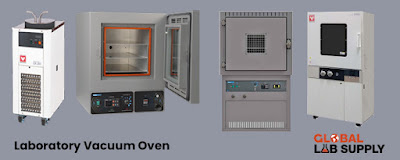A vacuum oven is a type of industrial machinery that is utilized in the clinical, commercial, pharmaceutical, microbiological, and agricultural fields. It operates generally by baking, drying, or sterilizing a variety of materials in vacuum circumstances, including those that are quick to decompose, heat reactive, oxidizing chemicals, exploding and combustible, and power drying.
To put it another way, the vacuum oven can eliminate gas, humidity, and other potentially harmful compounds to minimize undesirable interactions. The oven is frequently used as the last step in a procedure because drying reduces the possibility of oxidation process while carefully and uniformly drying fragile materials and reducing the danger of humans becoming contaminated to these compounds at the location.
The Characteristics of a Vacuum Oven
Since these ovens are comparable to ovens and can heat objects in a vacuumed environment, they are called vacuum ovens. The compartment makes it appear to be the oven's primary method, as it lowers the boiling temperature and density of most materials. The vacuum oven can use the technique to vaporize any unneeded chemicals that might be included in the specimen, but it does so without destroying it. The impact is similar to when the boiling temperature of fluid drops at a high altitude.
As a result, the oven's characteristics could be described as follows:
- It has cooling technology installed.
- It includes a recorder, alarm systems, and clocks.
- Racks, cabinets, and various carts are also included.
- The vacuum oven's general architecture is explosion-resistive.
The Advantages of Using a Vacuum Oven
Apart from the characteristics, there are many noteworthy advantages to using a vacuum oven, including:
- The oven's ideal vacuum condition may drastically lower the boiling temperature of materials, making it suitable for usage on heat-sensitive materials.
- With the assistance of this furnace and its drying procedure, a variety of difficult components and porous materials can be cleaned perfectly.
- The usage of a vacuum oven can help to speed up the drying process for items that are difficult to dry, like granular or powder materials.
- The potential of thermal outburst is fully removed in sterile or vacuum circumstances that prefer to predominate in the device, although this cannot be assured in a regular atmosphere.
- When contrasted to the conventional air movement technique for drying, the granular particles are not dispersed and there is no air movement within the device. Aside from that, the oven's lifespan is substantially superior, as it has very little interaction with the air outside.
As a result, it can be established that the operation of a vacuum oven is very fascinating, which contributes to a huge spectrum of benefits it has to provide.
Various Applications of A Vacuum Oven
Any wet material could be dried or the moisture eliminated by producing a vacuum. Vacuum drying refers to a mass transportation process in which humidity is included. Drying is a key activity in businesses such as food, pharmaceuticals, agriculture, and others. This will result in a significant final output. Rapid cooling, disinfecting, maturing, baking, welding and soldering, preheating, hardening, drying, casting, and so on are some of the activities.
Vacuum is utilized in a variety of ways, including cleaning, drying, and heating. Technology has progressed to the point where burdensome things have become simple in our everyday routines.
They've also been a benefit to the companies, allowing them to better meet the needs and desires of their customers and sales.
A professional vacuum oven is perfect for baking, treating, and drying a variety of materials. If your sector has a specific requirement, producers can meet it by changing the oven's elements. These ovens are known as large-purpose heaters because they help with data gathering and enhanced monitoring mechanisms.
Using high-precision temperature management, rapid warming duration, and speedy drying, a sturdy vacuum dryer oven will simply generate more profit for your business. Furthermore, it can manage heat-sensitive items like foodstuffs, pharmaceuticals, as well as more, and its miracles can just be realized whenever you purchase superior grade ovens for your enterprise.
Consult us right now to obtain the best deal on a vacuum oven
Global Lab Supply carries a wide range of vacuum ovens. Whether it's for a standard educational laboratory or the analysis of world-renowned researchers, we have a variety of vacuum oven models to choose from. If you want modern laboratory instruments, we can help.
